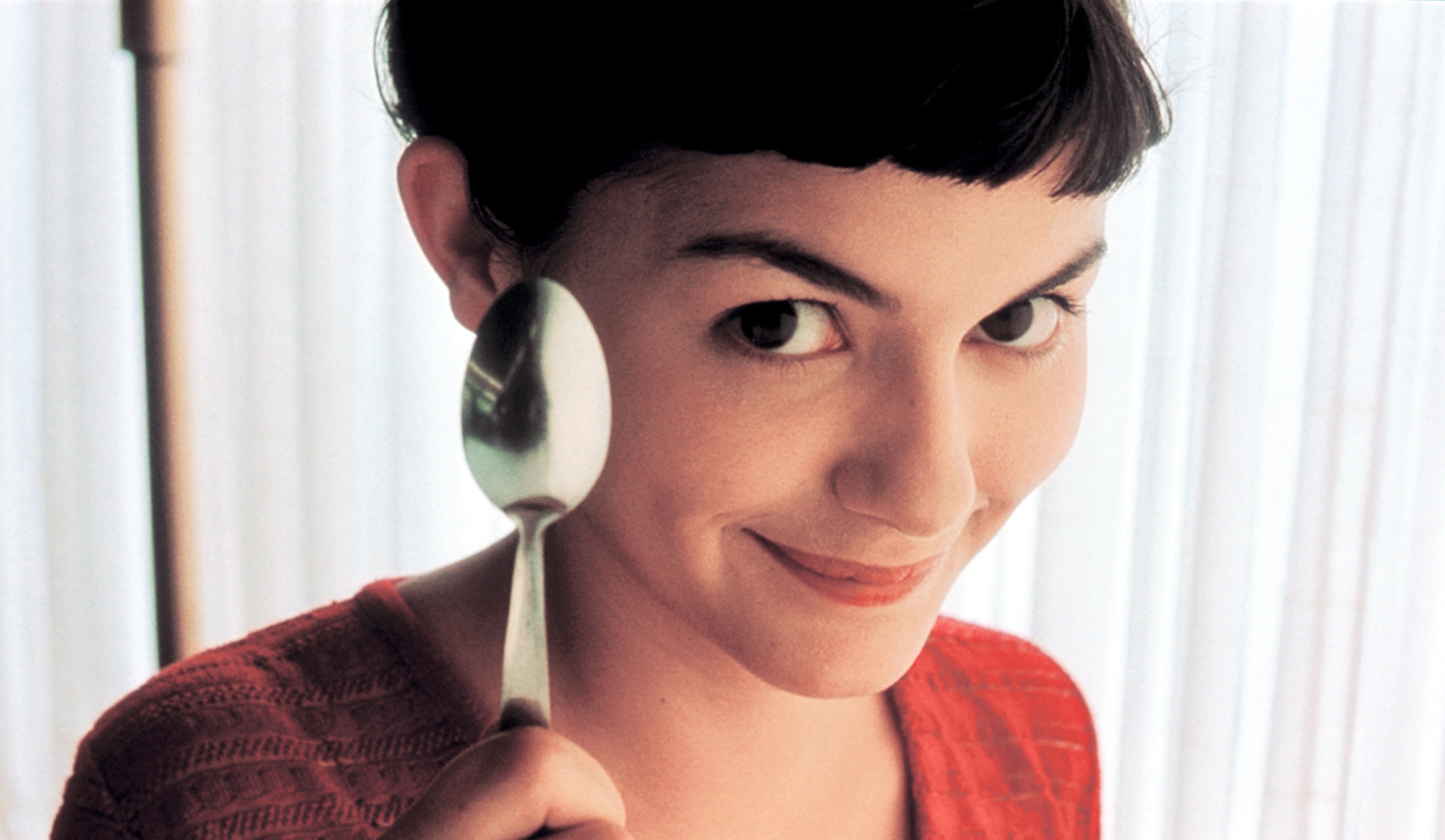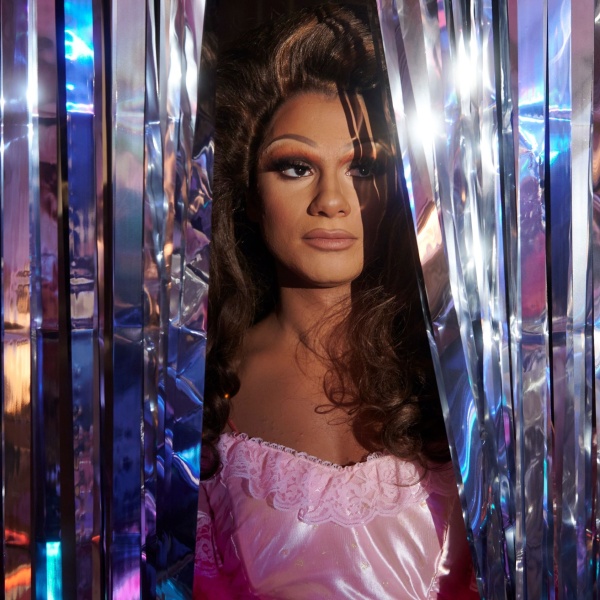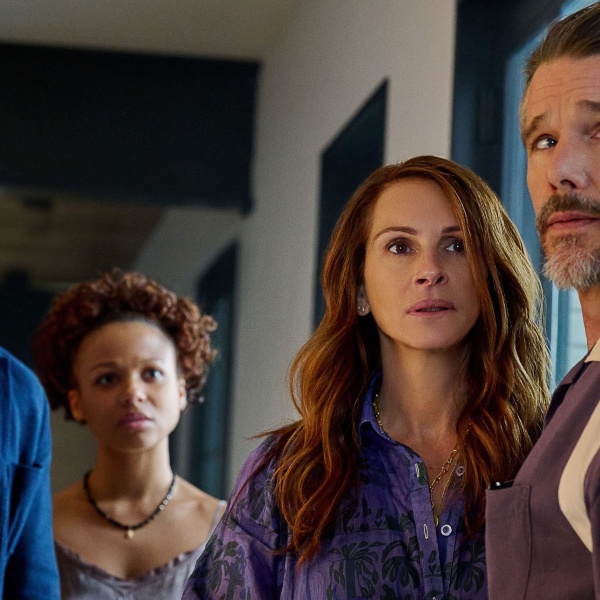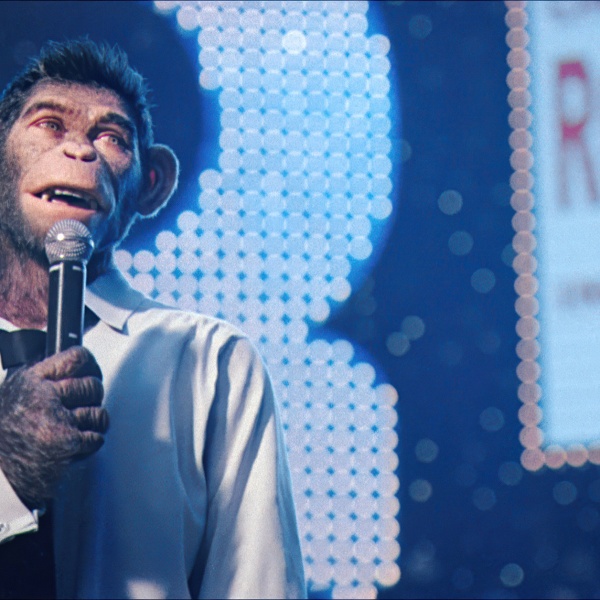Cannes rejected it. The Oscars ignored it. But “Amélie” lives on, as everyone’s favorite crème-brulee-cracking, stone-skipping Montmartre mischief-maker and romantic go-between is back in theaters come Valentine’s Day, courtesy of Sony Pictures Classics.
“Amélie,” directed by Jean-Pierre Jeunet and written by the French filmmaker with Guillaume Laurant, remains one of the 21st-century arthouse’s most imaginative confections, the rare film perhaps more misunderstood now than it was when it came out in 2001. Make no mistake that “Amélie” was huge then. There was the box office, the awards, the infectious swells of composer Yann Tiersen’s music in the air (at least in my headphones), and then came the imitators. I remember in college a close friend had a poster of the film pinned to her dorm room wall, a bemused Audrey Tautou upright in bed flanked by framed pictures of an Elizabeth-collared dog and a white-feathered fowl, and she’d listen to Tiersen’s jaunty accordion on her iPod in walks between classes. In 2017, a flouncy Broadway musical adaptation came and went. No one remembers that, and it left the director “disgusted,” anyway. But as Jeunet told IndieWire, an American re-release of the movie 23 years later “is a dream.”
Starring Audrey Tautou as a daydreaming waitress in Paris who distracts herself from love’s loom by fixating on others’ messy, unfinished lives instead of her own, Jeunet’s film was a stylish marriage of the arthouse (there’s sex, sadness, and longing, all draped in vermilion-reds, ochres, and greens) with the more commercial fixings of a classic romantic comedy (girl meets boy, girl plants all possible obstacles to avoid him, girl gets out of her own way and finds a happy ending). Amélie, lonely in life, decides to improve the lives of her Parisian neighbors — a painter obsessively creating facsimiles only of Renoir’s “Luncheon of the Boating Party” year after year, a hypochondriac cigarette salesgirl, Amélie’s father long-grieving the rather slapstick death of her neurotic mother — all while shortchanging her own shots at happiness and destiny. Were “Amélie” to release in earnest now, I imagine it would inspire its own brand of Barbiecore: women with short bobs, snapping TikToks on the Canal Saint-Martin, channeling their untapped joie de vivre. Nino Quincampoix (Mathieu Kassovitz), the unusual and handsome man Amélie eventually ends up with after much unnecessary chasing and skirting, even painstakingly assembles into an album book the Polaroid scraps of selfie-takers left aside in photobooth kiosks — a quirky project you can bet a contemporary distributor would capitalize on in its marketing and FYC efforts.
Shortly after opening in France in April 2001, “Amélie” sold to Miramax for U.S. release for an eye-popping (for the time) sum that other courting North American distributors (Sony Pictures Classics among them) couldn’t trounce, an out-of-the-gate acquisition figure not dissimilar to dealings in the new age of Apple and Netflix. Sony Pictures Classics, who released Jeunet and co-director Marc Caro’s “The City of Lost Children” in 1995 to mixed reviews, always had its eye on Jeunet, acquiring “Amélie” last year for re-release in the vein of its recent repertory rollouts like last year’s “Crouching Tiger, Hidden Dragon” (which came from Sony Classics in-house). The arthouse distributor will now take “Amélie” back out into the world this February.
“The films of Jeunet really do stand the test of time,” Sony Pictures Classics co-president Michael Barker told IndieWire. “’Amélie’ was a movie we were interested in, but Miramax bought it for a sizable amount of money. We’ve always loved Jeunet. We also had a movie of his called ‘Micmacs,’ a beautiful film, and what we realized was ‘Amélie’s’ rights became available. We pursued them for a long period of time. When we acquired the rights, it became obvious that this was a film that not only was really popular when it opened, but it has continued to be popular year and year out when you see how well it’s done on home entertainment. The movie is prime for a reissue because it is that popular… It makes sense to open it on Valentine’s Day because it’s one of the most romantic pictures ever. We’re opening on 250 screens because it’s such a known item. The idea is people would want to see it either for the first time or see it again on the big screen.”
“Amélie” has grossed more than $267 million in its lifetime, but that international fervor didn’t exactly carry over to the Oscars. While Jeunet’s film was up in five categories (including Best Foreign Language Film, losing to Bosnia and Herzegovina’s “No Man’s Land”), “Amélie” went back to France emptyhanded. According to the filmmaker in conversation with IndieWire, the Academy took a resistance toward the long-Oscar-dominating Weinsteins and their Miramax company, refusing “Amélie” any honors due to an overall fatigue with Harvey Weinstein’s dogged, bribery-based campaigning over the years. (The 2002 Oscars, remember, was the year of Universal’s “A Beautiful Mind” winning the evening.) The beleaguered producer, however, did not snip one frame of “Amélie,” even though Jeunet would tussle with him over a later film, as we discuss below.
Jeunet spoke to IndieWire out of Provence, France, where he splits his time between, of course, the Montmartre neighborhood in Paris, “very close to the Café des 2 Moulins,” where Amélie worked.
This interview has been condensed and edited for clarity and length.
IndieWire: Obviously the movie was huge in the arthouse scene here in the United States. What was the cultural phenomenon of “Amélie” like in France?
Jean-Pierre Jeunet: It happened step by step. It wasn’t after one day, and the very first news was bad because the Cannes Film Festival didn’t like it. The boss [then-president Gilles Jacob] watched it, and I was in the room, and I saw the bald head of the boss, and I felt bad vibrations. I felt, ‘He doesn’t like it.’ They refused the film, and it was a big controversy, a big scandal. In fact, it was good advertising for us. Little by little, my press attaché said, “I don’t know what happened but everybody loves it.” Every day, we had some good news, something new. For the awards, for the audience, or the critics, every day it was a good surprise. It’s once in a lifetime, of course. I know that. But it’s good when it happens. It was just a small film for me, something very personal, and I never expected something big. When I say big, it was huge in fact.

Were you surprised “Amélie” didn’t win any of its five Academy Award nominations?
Jeunet: That year, the Academy decided to boycott Miramax because Mr. Weinstein … he did something not good. He sent some gifts, you know what I mean. The Academy said, “We won’t vote for ‘Amélie.’” It was in The Hollywood Reporter. We knew at the Golden Globes. Remember “No Man’s Land” [the film that won Best Foreign Language Film over “Amélie” at the Oscars]. It was a good film, but it wasn’t the success of “Amélie.” It was a bad surprise, but it was at the end of the story, after the release, we had so much good. We didn’t care. Now, I regret it, because the statue is so beautiful. I would’ve wanted to have that statue on my shelf. It’s a small regret. During the awards ceremony, [the host] was Whoopi Goldberg, and all the time, she made jokes about Harvey Weinstein. [Miramax] had 19 nominations that year, and they won maybe one [for Best Supporting Actor Jim Broadbent in “Iris”].
Harvey Weinstein didn’t make any cuts to the film. Had you heard that might happen by the time Miramax acquired it for the U.S.? He was notorious for editing directors’ work.
Jeunet: “The Young and Prodigious T. S. Spivet,” my last film [with Weinstein], he wanted to cut it, and I refused. And the same thing for “Delicatessen.” He wanted to cut everything, with [co-director] Marc Caro, we said, “We have another idea: You cut our names from the credits,” and I expected to find my dog’s head cut on my bed. For “Amélie,” he couldn’t because it was too late. “Amélie” was in Toronto. It was a big success everywhere. It was too late for him to cut. In fact, for Harvey Weinstein, it was a question of power. It was a question to show his power. Not only with women, but everyone, the collaborators, the auteur. He never cut “Amélie.” He never cut my movies.

You famously wanted Emily Watson for the role of Amélie Poulain. Why did she turn it down?
Jeunet: In fact, I don’t remember. It was a very bad surprise. I had a dinner at home, and I couldn’t eat because I was so depressed. I didn’t know why. She told me it was for personal reasons. I met her during a ceremony in LA for critics or something. She was very nice to me, but I never knew exactly the reason. I met just two French actresses: Emma de Caunes and Audrey. It was such a big surprise immediately. You can see the moment of the casting on the bonus of the DVD, I asked her, “Where do you come from?” I was totally amazed. She was younger than Amélie was, but there was something fresher she brought to the film, and when you have a big success, it’s because the stars are in line, good music, some good ideas, a good actress. It’s a kind of miracle. It happens once in a lifetime.
What was your inspiration for the film’s distinct color palette, as shot by Bruno Delbonnel? So many shots have this green cast over them, but you also fill the frame with warm reds and oranges. There’s nothing like it.
Jeunet: I was at a birthday party, and it was a painter, and he gave me a book, and it was full of pictures with green, red, and I thought, oh my god, this is the main influence. It’s very important to speak with pictures when you work with production design, costume design, the DP, because if you speak with words, everybody can imagine something else. If you put two or three pictures [together], at the end, it won’t be similar to the pictures, but it’s a guide. Everybody has to follow the guide. Sometimes it’s one photo, one painting; it’s not necessary to have thousands of pictures. It was the beginning of the digital color-grading. Probably, we were in France the first or second film in digital color-grading, and probably that’s the reason we pushed a lot the purple, the green, the warm tone. Probably it’s too much, and now I would do something more subtle. But we were so happy to play with the new tool. We pushed a lot, and American Cinematographer said, “This is the most important film of the decade.” We were very proud about that.
For example, when she’s in her apartment, she has a purple lamp, and the rest of the frame is warm, and with an optical, chemical process, it wouldn’t be possible to do that, but with digital, we could, so it was a kind of game.

There are so many great minor roles and extras in this film, like all the Parisians whom Amélie imagines having orgasms throughout the city at the same time.
Jeunet: Everything is storyboarded. I am very precise. It’s not a question of editing, it’s a question of storyboard. Everything is in my head. Mostly, it’s on the paper. I love to work. I believe in working hard. I am a big worker, to sand and to put varnish. For example, for the casting, I made some tests with everyone, even for the smallest character. “Ticket please?” I saw maybe 20 people. After the storyboard, I go onstage during the weekend, and I prepare the week ahead with some stand-ins on the set with a photo camera.
Was there pressure after the film’s success to deliver another “Amélie”? You went on to make a completely different film, the period love story “A Very Long Engagement,” with Warner Bros. But I wonder if you felt stuck after buzz around “Amélie” ebbed.
Jeunet: No, it gave me the opportunity to make “A Very Long Engagement” because it was a novel I’d had in mind for a long time, but I couldn’t expect to have the money. It was too expensive. But because of the success of “Amélie,” I called Warner Bros. They were the owners of the rights, to say, I want to make this film. Because of Amélie, they said, “Why not?” I remember an appointment in LA with the big boss of Warner. I said, “I want the freedom.” “OK, no problem.” “I want the final cut.” “OK, no problem.” And I want a French actress. “OK, no problem.” And I want to shoot in French. “OK, no problem.” I thought, where is the trap? They were very nice to me. The producer, Richard Fox, I love this man, gave me total freedom, and I made a beautiful film. I love “A Very Long Engagement.” It wasn’t a big problem after “Amélie.” When I met Audrey, I thought, oh, she will be the Mathilde of “A Very Long Engagement.”
Did Audrey feel like she didn’t want people to just know her as Amélie after the movie’s success?
Jeunet: At first, she wasn’t very happy about the success of the film. She told me, “I will change my job. I hate to be known. I hate when people take a picture of you without permission.” She was very depressed after “Amélie.” And I said, “OK, I know at the supermarket, they are looking for cashiers. I will push you.” And she said, “OK, I know, I am very lucky.” I said, “Yes, you are very lucky. Life is difficult for everyone. You cannot complain.” She doesn’t work a lot. She makes some very different things, and now she doesn’t want to work again because she has a daughter she adopted. She’s from Vietnam, and she loves her and wants to be with the little girl, and she doesn’t want to shoot for the moment. I hope that one more time she will be back, but for the moment, she is with the little girl. She has a very strong character. For example, we had a screening with Jacques Chirac, [then] the French president, for “Amélie.” She arrived a little late, and Jacques Chirac said, “Oh I thought you weren’t supposed to come.” She said, “You have to check your sources.”
There have been so many homages to “Amélie,” including the Broadway musical you disliked. Was there anything else in the style of “Amélie” that you appreciated?
Jeunet: I have a Chinese DVD, and it’s another French movie with Audrey [‘Happenstance’] I don’t know the title in English, and they said “Amélie 2,” and on the back it’s with Bruce Willis, produced by Walt Disney.

Was there anything about the movie you felt was misunderstoodat the time?
Jeunet: When we make a big success, some people take advantage to speak about themselves. They spit on you like you made the worst piece of shit on earth because they know it will be a big controversy, and we had this problem in France. You get pissed off in this case, because when you have a big success, you want it to be a dream all the time, but it’s not the case. Of course, you have something to put the shit on the table. It happens for everything.
Was making the very personal “Amélie” three years later a response to your experience making 1997’s “Alien: Resurrection” as a director for hirein Hollywood?You’ve feuded with screenwriter Joss Whedon over this movie in the aftermath.
Jeunet: They hated it in the U.S.A. They said it’s an “arty” movie. I love that I made an “arty” movie in Hollywood. “Arty” is a bad word in Hollywood. It was a good experience. 20th Century Fox gave me almost total freedom. It wasn’t easy because it’s always too expensive, always too long, you have to cut some shots, but at the end, it was a great experience. I met someone during the shooting in the editing room… [Jeunet brings his wife, Liza Sullivan, an assistant editor on “Alien: Resurrection,” into the Zoom.]
Liza Sullivan: You’re not supposed to sleep with a director, but I did.
Would you ever make another movie in Hollywood?
Jeunet: I think they forgot me. I turned down a big, big proposition. It was “Harry Potter,” don’t ask me which one [“The Order of the Phoenix”]. But it was a big proposition with [producer] David Heyman, and it was for me. But I’d just finished “A Very Long Engagement.” I was tired, I was exhausted, and I had to start next Monday, and I couldn’t. I’d have to leave the film [“A Very Long Engagement”] and do no promotion. I loved to travel around the world with “A Very Long Engagement.” Another reason: Everything was ready. The costume design, the story, the casting. I had to just be a director, so I turned it down. Sometimes I regret, and think I probably made a mistake, but this is the story. And I lost two or three years working on “Life of Pi.” We wrote a beautiful adaptation. Everybody loved that. The author of the novel, 20th Century Fox. It was just too expensive. And I proposed to produce myself, and it was OK, because the difference between the Euro and the dollar, it was the same thing. So I said, wait three years, we will be able to make the tiger in CGI, but they hired Ang Lee.
You’ve only been represented in the Best International Feature Oscar race once, with “Amélie.” Do you keep tabs on the French submissions? I’m curious about your reaction to this year’s controversy over France submitting “The Taste of Things,” which wasn’t nominated, only for “Anatomy of a Fall” to receive five Oscar nominations, as “Amélie” did.
Jeunet: In fact, I appreciated both. I loved the film about the cooking [“The Taste of Things”], but I don’t know what happened. This is a little bit weird. Maybe because the director [of “Anatomy of a Fall,” Justine Triet”] made a speech when she won the Palme d’Or, and maybe they didn’t like it. I follow because I am in the Academy, and I saw some screenings in Paris. It’s often the case with a director and actor, they come to Paris. I loved “Maestro,” and I spoke with Carey Mulligan and Bradley Cooper. I remember they asked me, “What are you doing?” I said, “I am the director of ‘Amélie.’” They said, “Wow!” It was great, probably because they wanted a vote for them.
Sony Pictures Classics will re-release “Amélie” in select theaters on February 14.





